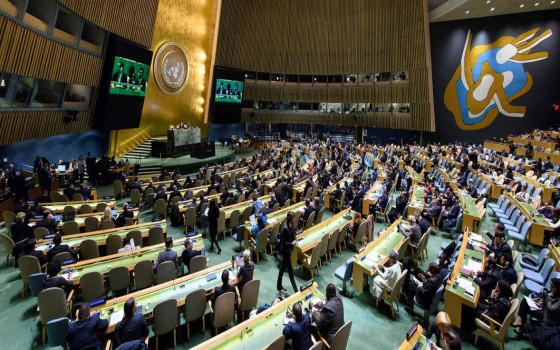
Diplomacy has not always succeeded in preventing conflict and violence. UN: Hunger, destruction, and death in Gaza mean we are witnessing the last gasp of a humanitarian system based on humanitarian principles.

- Europe and Arabs
- Wednesday , 23 July 2025 8:10 AM GMT
Gaza - New York: Europe and the Arabs
UN Secretary-General António Guterres said that although diplomacy has not always succeeded in preventing conflicts, violence, and instability, it 'can still stop them,' stressing that cooperation based on shared interests and the common good is the sustainable path to peace. This came in the briefing the Secretary-General delivered to the high-level open debate of the UN Security Council on Tuesday on the theme "Strengthening international peace and security through multilateralism and the peaceful settlement of disputes."
Guterres said that the UN Charter established a number of important tools for peacebuilding, commending Pakistan for submitting a draft resolution urging all Member States to make full use of these tools in the collective pursuit of global peace. It is noteworthy that Pakistan, which holds the presidency of the Security Council for the month of July, had called for this session.
The Secretary-General added, "This is needed now more than ever." “Around the world, we are witnessing a complete disregard for, if not outright violations of, international law, including international human rights law, international refugee law, international humanitarian law, and the UN Charter itself, without any accountability.”
The situation in Gaza as an example
The UN Secretary-General warned of widening geopolitical divisions and conflicts, noting that the cost is enormous, measured in human lives, devastated communities, and lost futures.
He said: “We need look no further than the scene of horror in Gaza—with a level of death and destruction unparalleled in recent times. Malnutrition is on the rise. Hunger is knocking on every door. And now we are witnessing the last gasp of a humanitarian system based on humanitarian principles. This system is being deprived of the conditions for operation. It is being deprived of the space to deliver assistance. It is being deprived of the safety to save lives. With the intensification of Israeli military operations and the issuance of new displacement orders in Deir al-Balah, destruction is piling up on destruction.
The Secretary-General expressed his horror at the bombing of United Nations facilities in Gaza, including those of the United Nations Office for Project Services and the World Health Organization, including the WHO's main warehouse. He said this bombing occurred despite all parties being informed of the locations of these UN facilities. He added: "These facilities are inviolable and must be protected under international humanitarian law, without exception."
Three areas related to the Charter for the Future
The Secretary-General explained that "peace is a choice. The world expects the UN Security Council to help countries make this choice.”
He pointed to some inspiring examples of finding common ground and formulating solutions to global problems, from the Seville Conference on Financing for Development, to the Ocean Conference in Nice, to the Convention on Marine Biological Diversity in Areas Beyond National Jurisdiction and the Cybercrime Convention, and to the Charter for the Future adopted last year.
He said that, given today’s discussion, “there are three areas where we can fulfill the Charter for the Future’s call to renew our commitment—and the world’s trust—to multilateral problem-solving mechanisms.” These areas are:
First, Security Council members, especially its permanent members, must continue to work to overcome divisions.
Second, the Security Council must continue to strengthen cooperation with regional and subregional partners.
Third, Member States must fulfill their obligations under international law, including the UN Charter, international human rights law, and international humanitarian law.
Guterres concluded his remarks by saying: “As we celebrate the 80th anniversary of our Organization and the Charter that gave it life and defined it, we must renew Our commitment to the spirit of multilateral peace through diplomacy.
Resolution adopted unanimously
Before the Secretary-General's address, the members of the Security Council voted unanimously in favor of a draft resolution submitted by Pakistan, which became Resolution 2788.
The resolution urges all Member States to avail themselves of mechanisms for the peaceful settlement of disputes, as set forth in Article 33 of the Charter of the United Nations, including negotiation, enquiry, mediation, conciliation, arbitration, judicial settlement, resort to regional agencies or arrangements, or other peaceful means of their own choice.
In the resolution, the Security Council reaffirmed its role—under Chapter VI of the Charter of the United Nations—to recommend appropriate procedures or methods for the peaceful settlement of disputes, including taking into account that the parties shall, as a general rule, refer legal disputes to the International Court of Justice in accordance with the provisions of the Statute of the Court.
The Security Council resolution also urged regional and subregional organizations to strengthen their efforts to settle disputes peacefully, consistent with the Charter of the United Nations and relevant Security Council resolutions, and encouraged Member States to support the role of regional and subregional organizations in this regard and to enhance cooperation. Between these organizations and the United Nations.
The Security Council resolution emphasizes the importance of integrating comprehensive approaches to the peaceful resolution of conflicts, while ensuring the full, equal, and meaningful participation of women and the meaningful involvement of youth in conflict prevention and resolution efforts.












No Comments Found